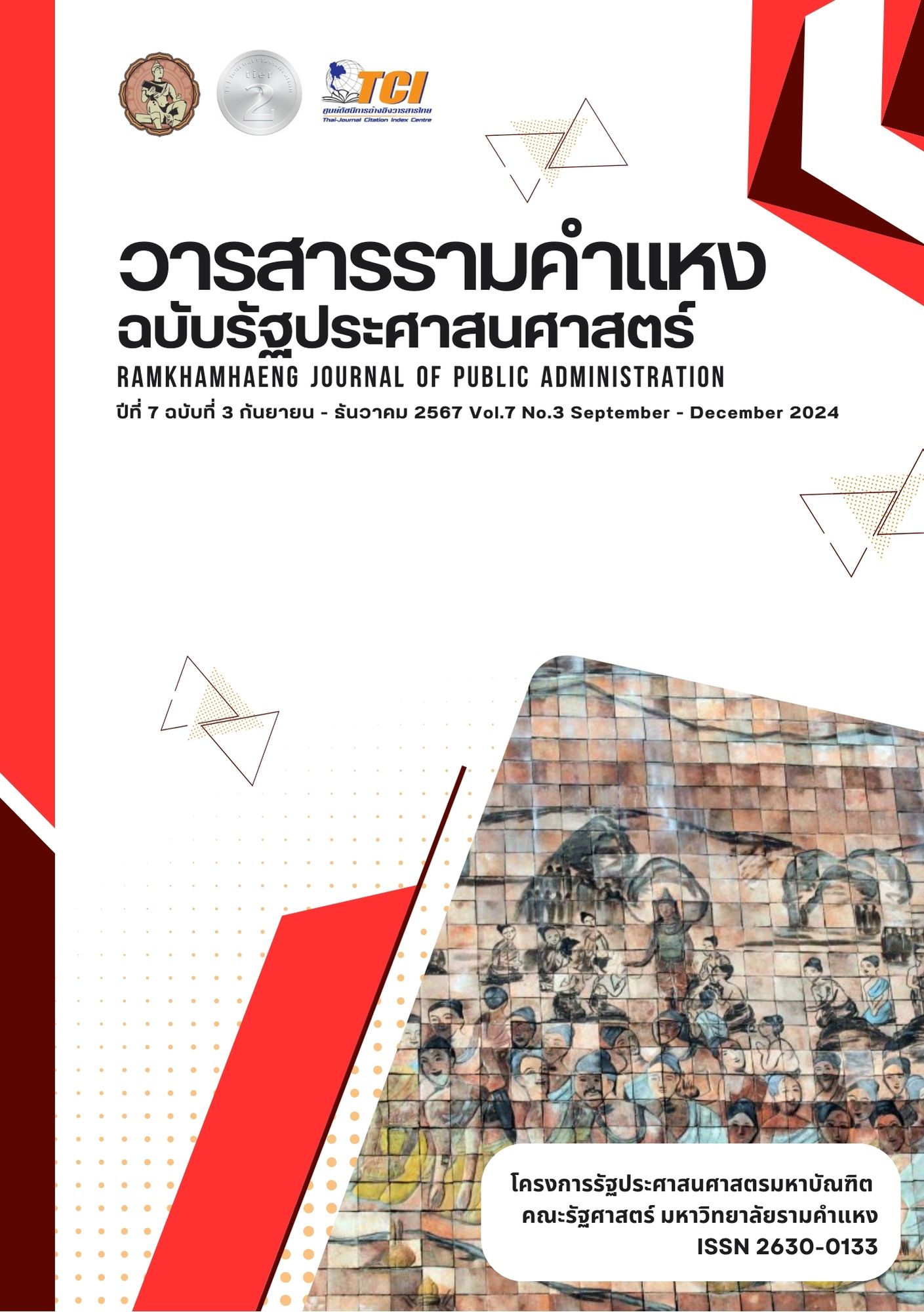The relationship between types of organizational culture and the behaviors of employee engagement of Government Officials under the Office of Permanent Secretary, Ministry of Commerce
Keywords:
Organizational Culture, Employee Engagement, Government OfficialsAbstract
The objectives of this research were to study 1) the importance level of types of organizational culture of the Office of the Permanent Secretary, Ministry of Commerce 2) the level of the behaviors of employee engagement of government officials 3) To compare the importance level of types of organizational culture, classified by personal characteristics 4) To compare the level of the behaviors of employee engagement of government officials, classified by personal characteristics and 5) the relationship between the importance level of types of organizational culture and the level of the behaviors of employee engagement of government officials. The research is quantitative research, the research purposive sample consisted government official who were born between 1980 and 2000, totally 487 people. The research instruments were a questionnaire. The statistics used for data analysis were descriptive statistics, including frequency, percentage, mean, standard deviation, and inferential statistics, including Independent-sample t-test, One-way ANOVA, and Pearson's Product-Moment Correlation Coefficient, the statistical significance level was set at the 0.01. The results of the research were as follows: 1) The importance level of all types of organizational culture were at a high level, the clan culture was the highest importance level 2) The level of the behaviors of employee engagement were at a high level, the strive was the highest level 3) Government officials who different of experiences and educational level, gave significantly different importance to organizational culture types 4) Government officials who different ages, experience, and job positions, had different levels of the behaviors of employee engagement and The level of importance of all types of organizational culture is positively related to the level of all aspects of the behaviors of employee engagement, the bureaucratic culture had the highest relationship with all aspects of the behaviors of employee engagement.
References
เจษฎา นกน้อย. (2560). พฤติกรรมองค์การ. พิมพ์ครั้งที่ 1. กรุงเทพมหานคร: สำนักพิมพ์จุฬาลงกรณ์มหาวิทยาลัย.
ชฎาภรณ์ เพียยุระ. (2565). คุณภาพชีวิตในการทำงานและวัฒนธรรมองค์การที่ส่งผลต่อความผูกพันต่อองค์กรของบุคลากรปกครองส่วนท้องถิ่น ในเขตอำเภอพรรณานิคมจังหวัดสกลนคร. ปริญญานิพนธ์รัฐประศาสนศาสตรมหาบัณฑิต สาขาวิชารัฐประศาสนศาสตร์ มหาวิทยาลัยราชภัฏสกลนคร.
ชิดชนก แตงอ่อน. (2557). ความสัมพันธ์ระหว่างการรับรู้วัฒนธรรมองค์กรและความผูกพันต่อองค์กรของพนักงงานโรงพยาบาลวิภาวดีกับการแสดงพฤติกรรมด้านสมรรถนะหลัก. การค้นคว้าอิสระบริหารธุรกิจมหาบัณฑิต สาขาวิชาการจัดการทั่วไป คณะบริหารธุรกิจ มหาวิทยาลัยเทคโนโลยีราชมงคลธัญบุรี.
ณัฏฐพันธ์ เขจรนันทน์. (2551). พฤติกรรมองค์การ. กรุงเทพมหานคร: บริษัท วี.พริ้นท์ (1991) จำกัด.
ดลนภา ดีบุปผา. (2555). ความสัมพันธ์ระหว่างวัฒนธรรมในองค์กร ความสัมพันธ์กับเพื่อนร่วมงานกับความผูกพันในองค์กร ของพนักงานบริษัทเอบี ฟู๊ด จังหวัดสมุทรปราการ. การศึกษาค้นคว้าอิสระศึกษาศาสตร์มหาบัณฑิต สาขาวิชาศึกษาศาสตร์ มหาวิทยาลัยสุโขทัยธรรมาธิราช.
นันทนา มาศภากร. (2561). “ปัจจัยวัฒนธรรมองค์การที่ส่งผลต่อความผูกพันในองค์การของพนักงานอุตสาหกรรมเซรามิกส์ จังหวัดราชบุรี.” วารสารวิทยาการจัดการ มหาวิทยาลัยราชภัฎนครปฐม. 5 (1), 31-41.
นิติพล ภูตะโชติ. (2556). พฤติกรรมองค์การ. พิมพ์ครั้งที่ 1. กรุงเทพมหานคร : บริษัท วี.พริ้นท์ (1991) จำกัด.
ปรารถนา ผกาแก้ว. (2561). การรับรู้วัฒนธรรมองค์กรกับความผูกพันต่อองค์กรของพนักงานกลุ่มเจนเนอเรชั่นเอ็กซ์ และกลุ่มเจเนอเรชั่นวาย ระดับปริญญาตรีขึ้นไป ในกลุ่มบริษัทผลิตชิ้นส่วนอิเล็กทรอนิกส์ จังหวัดพระนครศรีอยุธยา. การศึกษาค้นคว้าอิสระเศรษฐศาสตรมหาบัณฑิต สาขาเศรษฐศาสตร์ธุรกิจ คณะเศรษฐศาสตร์ มหาวิทยาลัยธรรมศาสตร์.
ราชกิจจานุเบกษา. (13 ตุลาคม 2561). ยุทธศาสตร์ชาติ (พ.ศ. 2561 - 2580). 135(82 ก), 64-71.
ราชกิจจานุเบกษา. (วันที่ 1 พฤศจิกายน 2565). แผนพัฒนาเศรษฐกิจและสังคมแห่งชาติ ฉบับที่ 13 (พ.ศ. 2566 - 2570). 139(258 ง), 132-138.
วัลลภ รัฐฉัตรานนท์. (2562). “การหาขนาดตัวอย่างที่เหมาะสมสำหรับการวิจัย: มายาคติในการใช้สูตรของ ทาโร ยามาเน่ และเครทซี-มอร์แกรน.” วารสารสหวิทยาการวิจัย: ฉบับบัณฑิตวิทยา. 8(1), 11-28.
สนธยา เกรียงไกร ณ พัทลุง. (2557). วัฒนธรรมองค์กรในทัศนะของพนักงานบริษัทในตำบลนิคมพัฒนา อำเภอนิคมพัฒนา จังหวัดระยอง. วิทยานิพนธ์ศิลปศาสตรมหาบัณฑิต สาขาสังคมศาสตร์เพื่อการพัฒนา บัณฑิตวิทยาลัย มหาวิทยาลัยราชภัฏรำไพพรรณี.
สมรักษ์ วิชาชู. (2554). ทัศนคติของพนักงานที่มีต่อวัฒนธรรมองค์กรของธนาคารทหารไทย จำกัด (มหาชน) สำนักงานใหญ่. การศึกษาค้นคว้าอิสระบริหารธุรกิจมหาบัณฑิต สาขาวิชาวิทยาการจัดการ มหาวิทยาลัยสุโขทัยธรรมาธิราช.
สุภาภรณ์ ประสงค์ทัน. (2555). ความผูกพันของพนักงานต่อองค์การ : การเพิ่มขีดความสามารถ ทางการแข่งขันของธุรกิจโรงแรมไทยยุค AEC. สืบค้นเมื่อวันที่ 1 ตุลาคม 2565. จาก http://www.cs.human.ku.ac.th/
สุลีวัลย์ หมีแรตร์ และนิตนา ฐานิตธนกร. (2560). ปัจจัยที่มีอิทธิพลต่อความผูกพันกับองค์กรของพนักงานบริษัทเอกชนในกรุงเทพมหานคร. การประชุมวิชาการระดับชาติมหาวิทยาลัยเกษตรศาสตร์ วิทยาเขตกำแพงแสน ครั้งที่ 14 : มหาวิทยาลัยเกษตรศาสตร์ วิทยาเขตกำแพงแสน สำนักงานวิทยาเขตกำแพงแสน กองบริหารวิชาการและนิสิต.
สุวิสา พลายแก้ว. (2557). วัฒนธรรมองค์การ ความผูกพันต่อองค์การที่ส่งผลต่อประสิทธิผลการปฏิบัติงานของบุคลากรในกองทัพอากาศ. การประชุมวิชาการระดับชาติ ประจำปี 2557. ปทุมธานี: สำนักพิมพ์มหาวิทยาลัยรังสิต.
สำนักงานปลัดกระทรวงพาณิชย์. (2564). แผนเสริมสร้างความผูกพันของบุคลากรสำนักงานปลัดกระทรวงพาณิชย์ประจำปีงบประมาณ พ.ศ. 2565 - 2567. สืบค้นเมื่อวันที่ 1 ตุลาคม 2565. จาก https://personnel.ops.moc.go.th/th/content/category/
อนุดิษฐ์ ฐานไชยกร. (2562). ความผูกพันในองค์การ. สืบค้นเมื่อวันที่ 1 ตุลาคม 2565. จาก https://so02.tci-thaijo.org/index.php/JRKSA/ article/view/246209
Alias, N.E., Othman, R. and Romaiha, N.R. (2022). [Serial online]. “The Effects of Organizational Culture on Employee Engagement : A Malaysian Manufacturing Company’s Perspective.” International Journal of Academic Research in Business and Social Sciences. 12(7), 1733-1745.
Daft, R.L. (2018). Organization Theory and Design. Tenth edition. Ohio: South-Western Cengage Learning.
Hewitt, A. (2015). Aon Hewitt’s Model of Employee Engagement. cited 2022 Sep, 15. from http://www.aon.com/human-capital-consulting/thought-leadership/talent/aon-hewitt-model-of-employee-engagement.jsp
Soni, S. (2019). “Impact of Organizational Culture on Employee Engagement and Effectiveness in Indian Manufacturing Company.” IITM Journal of Management and IT. 10(2), 42-52.
Downloads
Published
How to Cite
Issue
Section
Categories
License
Copyright (c) 2024 ยศพล แรกขึ้น, ชุลีวรรณ โชติวงษ์, สุภัททา ปิณฑะแพทย์

This work is licensed under a Creative Commons Attribution-NonCommercial-NoDerivatives 4.0 International License.



